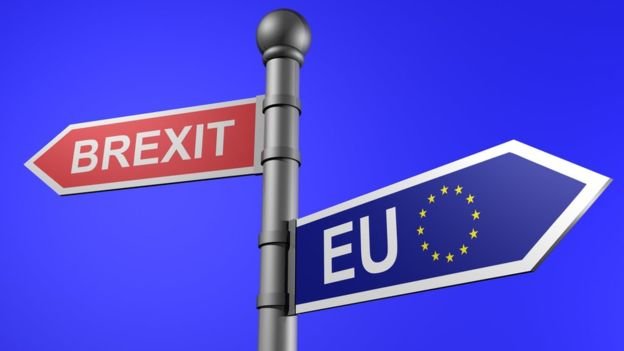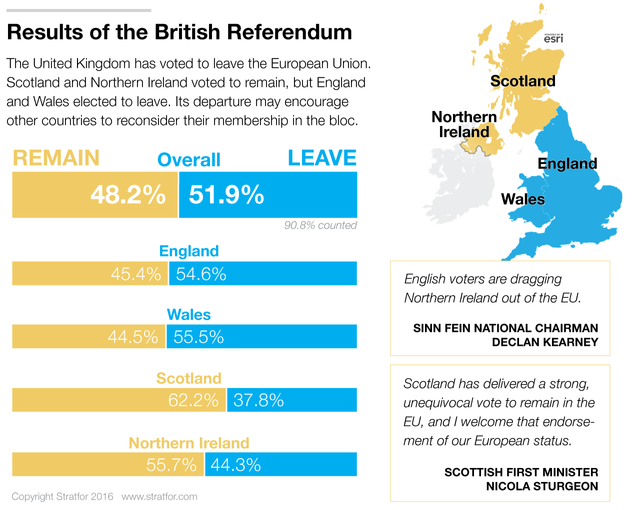Hey Guys,
Today I want to share my opinion about a second Brexit-referendum.

About two months ago, the United Kingdom voted on the exit from the eu. The result was for the exit, but it was very close. Many people did not agree with this conclusion. Especially young people, because they felt cheated of their future. Also, people from many other countries of the EU have criticized the UK for this decision, often insulted.
Here's a picture from stratfor:

They said you should not accept this decision. In addition, very quickly came calls for a second vote.
But is this still democracy?
The British have voted and chosen something. Maybe the voices were unevenly distributed (the young voted for an exit, the older people against it). But in a democracy this should be the indifferent ! The British were widely criticized: 'Your economy will stagnate' 'The pound will perish' and so on. It is the decision of the British, who bear the consequences. I think it is right when they leave the EU. They have chosen! And I say it again: It would be no democracy if they would vote until another (correct for the EU) result comes out.
What do you think?
Thanks for reading. I'm not a native english speaker, so excuse me for bad grammar.
Democracy is a difficult thing.
I think in general that truly irreversible decisions should require a bit more than a simple majority - i.e. two votes with a year in between both giving a simple majority, or more than 2/3 of the votes.
An example: consider some coastline with a nice beach, close to a bigger city. The beach is owned by the municipality and considered public property, anyone can enjoy the beach. There are two major political parties fighting for the municipality, party A and party B, most often party A has the majority, but sometimes party B wins the election. Party B has some rich supporters that has a strong desire to buy the beach and build private houses along the beach and fence it in.
When party A is in majority, it's status quo, the beach is still public property. When party B gets the majority of votes, they will ensure that the property is sold and privatized. This is very imbalanced, because at some time party B will get the majority, and once the beach has become privatized there is no way back, the public will not be able to enjoy the land anymore.
How does this relate to the "brexit referendum"? I'm not sure. At one hand, "keeping status quo" is something that can be reversed any time while "break with the union" may cause irreversible damage - with that perspective perhaps a new election is right. At the other hand, the rules should be set in advance, and the example above shows that if rerunning the elections every time one gets a result that the sitting govt is unhappy with, then in the end probably the result the sitting govt want to see will happen. No, that's not democracy...
Downvoting a post can decrease pending rewards and make it less visible. Common reasons:
Submit
It seems to me that in general the politicians want the union, while the citizens are not so happy with it. We see this in the UK now, and from my perspective here in Norway ... really a lot.
We've had two referendums on "should Norway join the EU", and both of them ended with a "no"-vote. I think it was fair game to keep two referendums since there was quite some time between them (1972/1994). Both referendums ended almost 50/50, simple majority against membership but only with a small margin.
One of the things that was not so fair was the date for the referendum. Norway, Sweden and Finland kept referendums in the same period. It's clearly advantageous for the Nordic countries to stick together and avoid the EU-border to be running right through the region. I believe the ordering of the referendums was a conspiracy; it was quite clear that Finland would say "yes", so the referendum was kept there first, hoping that the next country would be swayed into a "yes" as well. When both Finland and Sweden had said "yes", any pragmatic voter in Norway would be swayed into a "yes", and the whole region would vote for the union (it didn't work out that way). Keep the referendum the other way, Norway would almost for sure vote "no", Sweden would probably be swayed into a "no" due to that, and maybe Finland also would be swayed into "no".
What happened after the election ... well, the politicians wanted Norway to become a member. They sort of respected the referendum, so officially Norway is not part of the EU. However, the politicians have been signing so many agreements with EU that for most practical purposes Norway is a member of the union.
Downvoting a post can decrease pending rewards and make it less visible. Common reasons:
Submit
I agree in a democracy, there are winners and losers in every vote. In order for the true will of the people to be heard and for a vote to mean anything the decision should stand.
Downvoting a post can decrease pending rewards and make it less visible. Common reasons:
Submit
There are some possibilities for the UK to both sort of honor the referendum and sort of keep being in the union.
The "Norwegian way": let the politicians (who wants EU-membership) negotiate a deal keeping "status quo" just that officially UK is no longer a member. (seems a bit unlikely, as far as I've understood the EU-friendly politicians are resigning over this).
Through a split: Let England and Wales leave the union, Scotland to keep a new referendum over independence, and North-Ireland to keep a new referendum over weather to stay in the UK or unite with the rest of Ireland.
Figure out why the British citizens are unhappy with the EU, do negotiations with the EU, EU does some changes, new referendum. That's probably the most "democratic" solution. It's fair to keep a new referendum because changes have been done, the EU that the brits wanted to leave is not the same EU that the brits gets to vote for again.
Downvoting a post can decrease pending rewards and make it less visible. Common reasons:
Submit